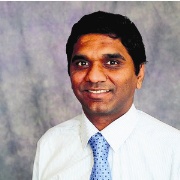
Dr Chandra Kanneganti: Audit access systems to find out where weaknesses lie
These kinds of stories are distressing, but as long as GPs accept the problem and make an action plan with their team and patients, it can be resolved in a few months’ time.
The first thing the practice should do is to resist defending itself. The fall-out is temporary and can be resolved.
Arrange an audit of capacity and demand for all GPs, practice nurses and HCAs.
Once these data have been collected, arrange a staff meeting to discuss the issues and come up with a solution to reduce the gaps – perhaps by introducing telephone consultations for all GPs to triage and manage patients, getting extra GP sessions or extending the length of consultation sessions.
Next, audit how many patients the GPs are calling for follow-up. There will be variability between each doctor and you can reduce this.
Manage book-ahead and same-day appointments according to demand. Ideally 20-30% of appointments should be available for advance booking for every GP session. The remainder can be same-day appointments.
Publish the findings of the audit along with these actions on the practice website and in the practice newsletter.
Be honest: show that the practice has taken the issues very seriously and has actions in place to resolve the issues. This will improve confidence among your patients.
Invite the patient participation group to discuss ways of improving access.
Ask them to help spread the message that the practice is willing to work on access.
Inform the local area team of actions taken, and show how seriously you have taken the patients’ concerns.
Dr Chandra Kanneganti is clinical director of community care at NHS Stoke CCG

Peter Higgins: Invite the media into the practice
You should take the bull by the horns and invite the local media in to learn the pressures of general practice at first hand.
Mobilise your best advocates: the patients. Work with the patient participation group to combat negative messages and see what they say about engaging positively with the patients. If you haven’t got a patient participation group I suggest you get one.
Check that staff are doing all they can to deal with demand. Consider updating the appointments system, perhaps by offering more telephone and online consultations. Check that the partners are using the practice team as efficiently and effectively as they can. The LMC should be able to help the partners assess access and staff use, and the CCG might also have resources to help improve this. Many practices are suffering the same problem, with patient demand exceeding the capacity of the practice.
The BMA has launched the ‘Your GP Cares’ campaign to promote the fact that GPs are frustrated that they can’t do more for their patients because of years of underfunding. Try promoting this in the practice. The campaign emphasises information such as the fact that spending on GP services is going down as demands are going up. If the practice has vacancies it can refer to the campaign to explain to patients and the media how difficult it currently is to attract staff.
An examination of these issues will demonstrate to the outside world and patients that the practice is doing all it can and the problem lies elsewhere.
Peter Higgins is chief executive of Lancashire & Cumbria LMCs Consortium

Dr Beverley Ward: Don’t dwell on the story, whatever it is
It can be upsetting to read negative comments in the media about the practice, especially when staff are working hard to meet increasing demand.
If the story is accurate, there is little point in trying to respond in the media. In any case, doing so may prolong the story. However, the practice should consider how to respond to the problem that has led to patient dissatisfaction.
As well as dealing with individual complaints, they may want to find a better way of managing demand.
Poor communication and perceived rudeness are a common cause of complaint. It’s worth looking into refresher training for reception staff in telephone skills and handling challenging patients, and ensuring there are enough staff to deal with patients at peak times.
There may be other actions the practice could take – for example, publishing the appointments policy on the website and in the practice leaflet. Ensure patients understand how best to access health professionals. If a GP is running late, reception staff could warn patients and apologise. It’s worth considering that most local paper news stories have a short shelf life. If patients can see the partners are taking action in response to the criticism they are likely to appreciate it. If the practice is able to reduce waiting times, they could offer the paper a story about how they did it.
Dr Beverley Ward is a medicolegal adviser for the Medical Defence Union
Pulse July survey
Take our July 2025 survey to potentially win £1.000 worth of tokens












